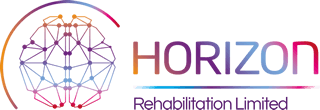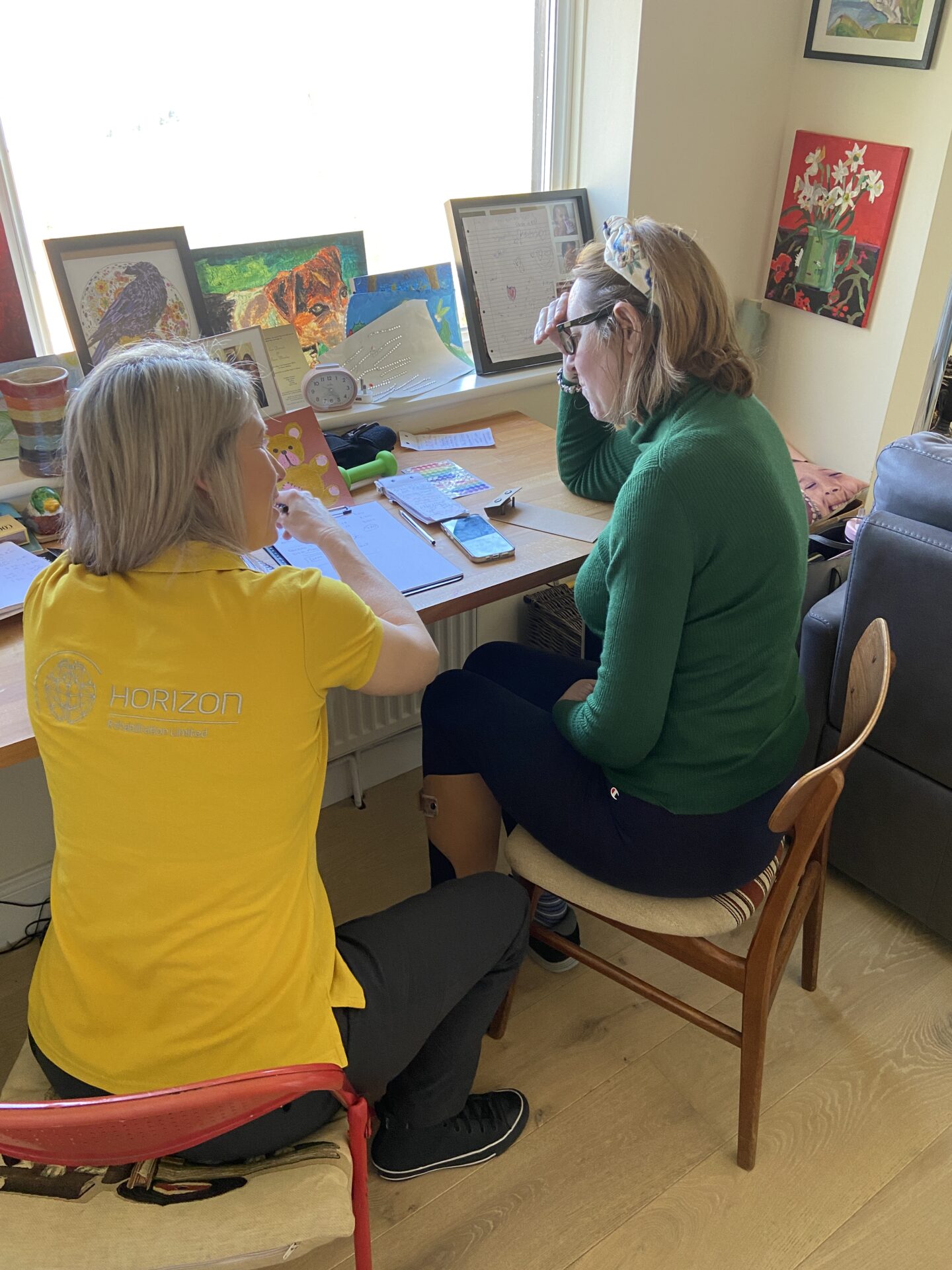“The aim is to give people the skills to be able to go into every task in life with confidence”
Jackie is an Occupational Therapist (OT) specialising in neurological conditions, with a particular interest and expertise in strokes.
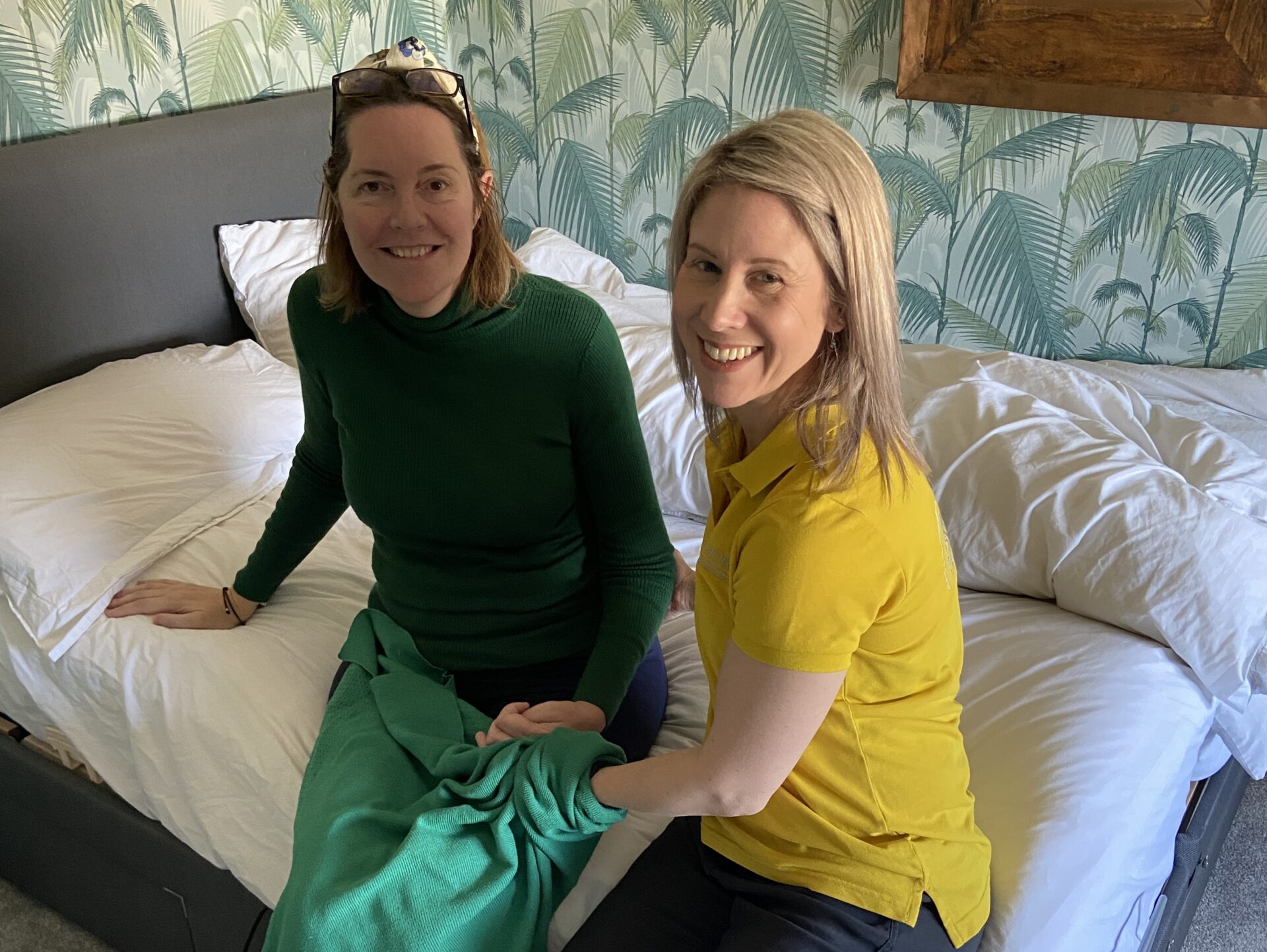
Jackie has spent more than 20 years working as an OT for the NHS, and continues to work part-time at the Neurorehabilitation unit based at Amersham Hospital.
She has been a valued member of staff at Horizon Rehabilitation since 2020 and helps us to offer a wide range of neurological support services for private clients, as an alternative option for those on NHS waiting lists.
Horizon’s Clinical Director, Karen, says:
“It’s quite rare for patients to be able to access private neurological rehabilitation in their own homes, especially from someone with the wealth of experience that Jackie has. We’re very fortunate to have her in our team.”
As an OT student, Jackie did a series of placements including medical orthopaedics, mental health and social services, but it was the time she spent on a stroke rehab unit that inspired her to specialise in this area.
She says:
“I just fell in love with helping stroke patients. There was never anything else that I wanted to do! When you first qualify as an OT, you do rotational posts to develop your foundation skills. You can’t specialise straight away, but as soon as I got the chance, I repeated my rotation on the stroke unit and I’ve stayed in neuro ever since.”
Jackie loves her job and the fact that she is always learning.
“Every day is fascinating. I never have a day where I don’t learn something. I enjoy being part of the Horizon team where there is such a commitment to continued
professional development.We do a lot of reflective practice, analysing what has worked for patients and why. It’s just a constant cycle of developing our practice to become even more specialised.”
Karen Blagojevic is a Bobath tutor, which means Jackie is one of the few Occupational Therapists in the UK to have completed 3 Bobath courses. (The Bobath Concept is based around the brain’s ability to adapt to change and reorganise and recover after neurological damage.)
Jackie is grateful for all of the training she’s received, and her qualifications combined with her many years of experience, enable her to make a life-changing difference to patients on their rehabilitation journey.
The whole picture
Patients calling into the clinic typically have a 30 minute triage consultation with a Physiotherapist before being referred to Jackie for OT support.
She explains:
“If somebody’s not achieving their goals or recovering in the way they expected to, I can help with the aspects of their rehabilitation that are not specific to their physical recovery.
As a team, we look at people holistically: we have a very detailed conversation about what’s happened, what their home situation is and what it is that they want to do. I’ll then look at the barriers they’re facing and help find a route forwards.”
When Jackie visits a patient at home, she completes a targeted assessment and develops a hypothesis about what is causing that person to struggle with particular tasks. The hypothesis is then tested through a cycle of treatment and ongoing assessments, during which Jackie creates opportunities for patients to exceed their own expectations and surprise themselves with what they can do!
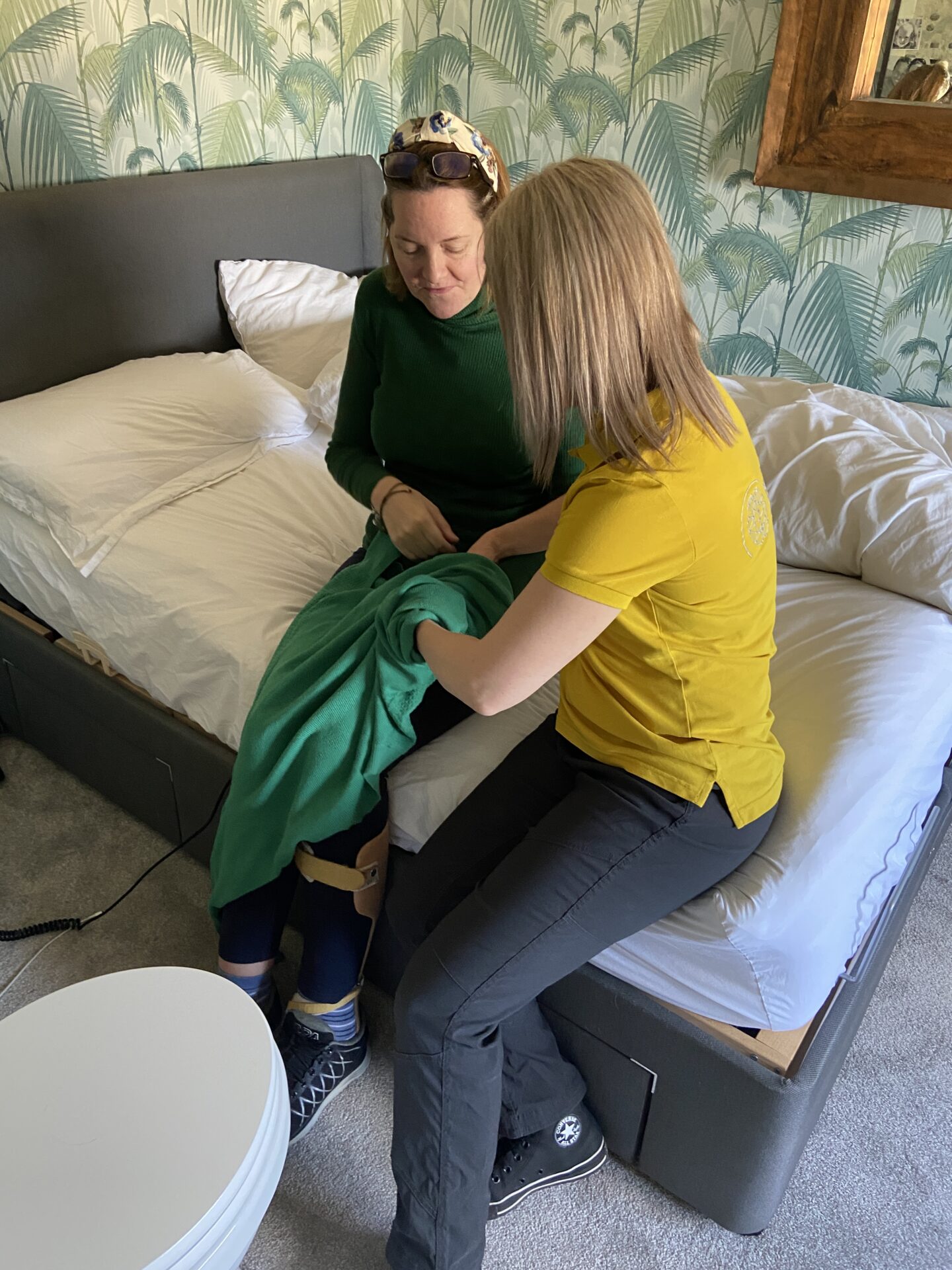
Our approach to at-home equipment
Introducing equipment to help a patient complete tasks they could previously accomplish independently is known as a ‘compensatory technique’. Jackie typically tries to avoid the need for equipment for as long as possible, focusing on helping the patient find other strategies instead.
This is supported by the Horizon Physios, who work to rebuild a patient’s strength, stamina, balance and confidence when it comes to physical tasks
As an OT, Jackie’s main remit is to rehabilitate patients by identifying their barriers to function and participation and then working on their skills to overcome those barriers.
Jackie says:
“We try as much as possible to reinstate the lost skill and understand the reasons why it has been lost.
Our aim is to give people the skills to be able to go into every task in life with confidence, rather than just compensate or retrain for one specific task.
I almost never go straight in with a piece of equipment because that doesn’t solve the root problem.”
Recovery is a journey
Jackie has a particular patient she has worked with since 2020, who suffered a stroke shortly before lockdown and was treated by Horizon’s Physiotherapists.
Jackie says:
“When I met this lady she was having four or five days a week of physio. She has some physical deficits and some pronounced cognitive problems, and I’ve been working with her on the cognitive issues – particularly her ‘feedback loop’ which has become impaired since her stroke, making it hard for her to learn from her own experiences.”
Holistic care
Jackie is able to deploy a host of different strategies to get the best outcomes for her patients and their families, targeting their memory and concentration as a way to learn adaptive techniques and reacquire lost skills.
“She has a carer with her all the time, apart from overnight, to make sure she stays safe. My role has been to help her become more aware of how her decisions affect her safety. We do a lot of functional tasks, community tasks, and activities such as Horizon’s group exercise classes.
She’s now able to dress herself and can safely participate in many more normal activities, such as going out for coffee or walking round a garden centre.”
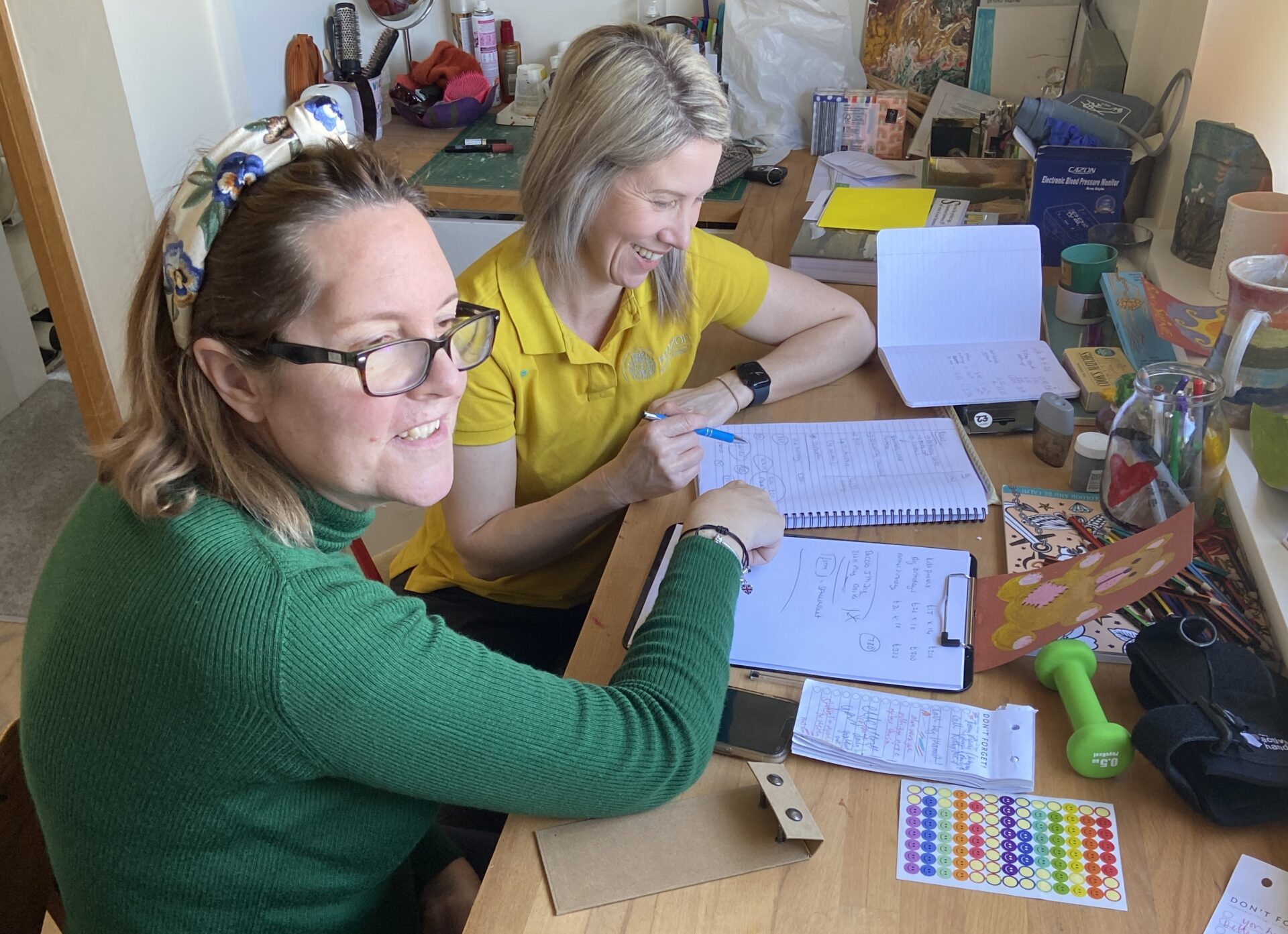
The impact of her work with neurological patients extends far wider than just their immediate family and friends.
Jackie’s stroke patient successfully applied to volunteer as a reading helper in a local primary school, where she is able to share her love of stories with children and contribute to the development of their literacy. This role has helped improve the patient’s own mental wellbeing and allowed her to cope with having to start her retirement earlier than planned.
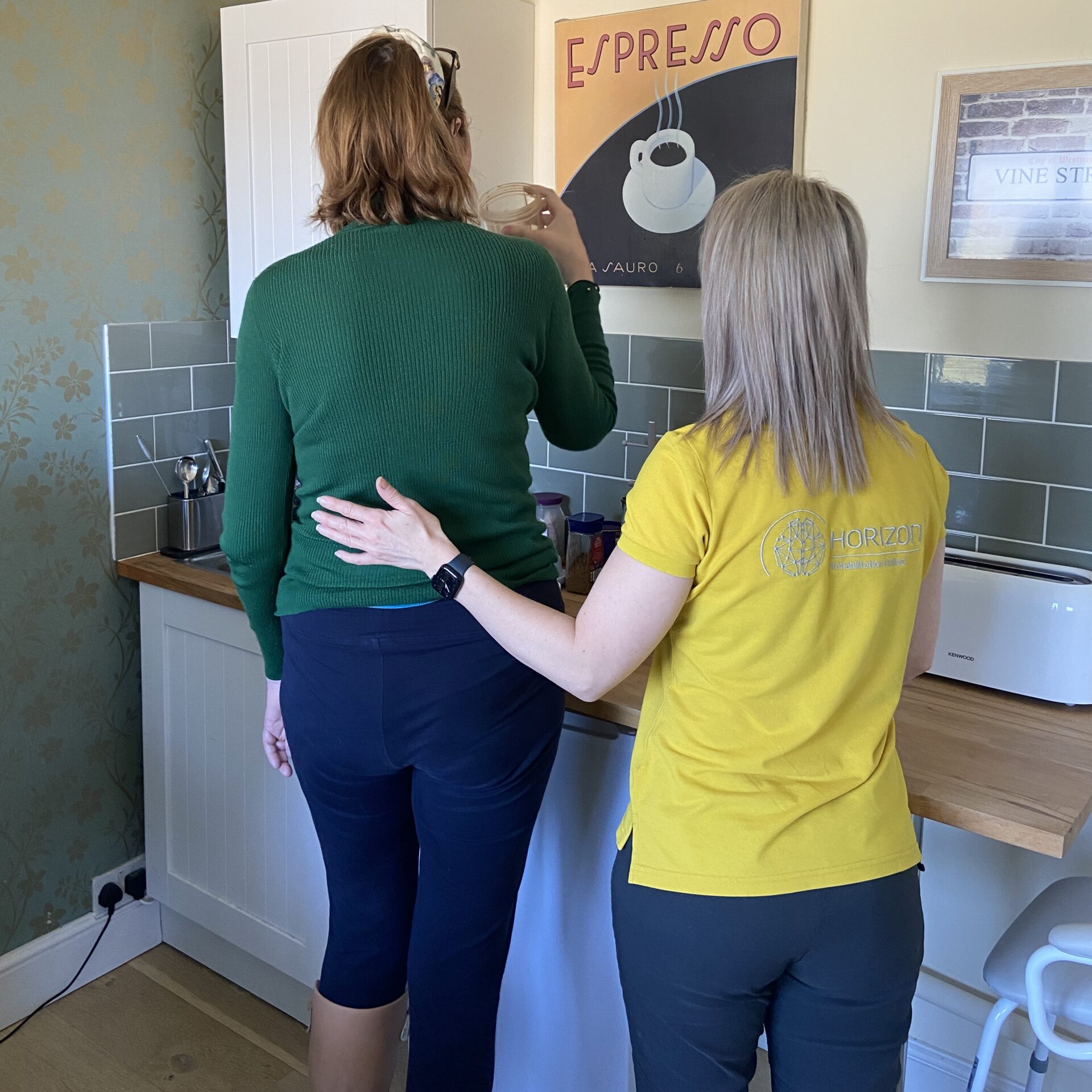
Jackie says:
“As well as making cognitive progress, a lot of our intervention is about helping the person get back to themselves.
It’s hugely motivating to see them able to achieve the things they want to do.
It’s so nice to see somebody who was literally in the house all day long being able to reintegrate and participate in society.”
Exceeding all expectations
Another patient of Jackie’s had a stroke around Christmas 2022 and has made exceptional progress with help from Horizon’s expert therapists.
Jackie says:
“He wanted to get back to work but was struggling with higher-level cognitive functioning and maintaining concentration, so we’ve worked with him to assess those issues and retrain some of those processes.
He now has a much greater awareness and a number of techniques he can use if his concentration is disrupted. He’s now gone back to work part time and is able to drive again, but currently still needs weekly sessions to review what’s improved, what hasn’t improved, and which self-cueing strategies he can use before he builds back up to working full time.”
Educating patients, carers and families, and helping them to reflect on how much progress has been made, is an important part of Jackie’s work.
With more than two decades of lived experience treating people with complex neurological difficulties, Jackie understands the far-reaching impact that a brain injury has on the lives of those around them.
She says:
“I’m able to look at the whole situation through a very specialist filter and target rehabilitation techniques and interventions that are going to make a difference for that individual. Sometimes it’s a very slow process, but there are often quick wins that will make a difference in somebody’s life almost straight away.”
